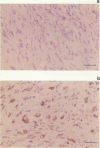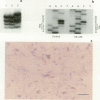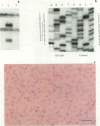Abstract
The p53 gene is one of the best studied tumour suppressor genes. Recently we performed mutation analysis on the p53 gene in a large number of bone and soft tissue sarcomas, and found that approximately one-third of the sarcomas have some type of DNA alteration at the p53 locus (Toguchida et al., 1992). However, the expression of the p53 protein resulting from these alterations still remains to be clarified. In this study, p53 expression in the sarcoma tissues was analysed immunohistochemically using antibody PAb421 (Oncogene Science) and its relationship to DNA alterations was examined. Of 113 tumours, 29 (25.7%) showed positive staining for the p53 protein. These included 19 of 67 osteosarcomas, five of 20 chondrosarcomas, four of 11 malignant fibrous histiocytomas (MFHs) and one Ewing's sarcoma. In chondrosarcomas, most of the p53-positive tumours belonged to highly malignant and atypical tumour types (dedifferentiated or mesenchymal type), suggesting a role for p53 mutation in the progression of cartilaginous tumours. All the cases with a missense mutation showed strongly positive staining, while no immunoreactivity was observed in the remaining three-quarters with DNA alterations including gross rearrangement, frame-shift mutation, nonsense mutation or mutation at splicing site except in one case. These results demonstrated the dominance of the p53 mutations with null protein expression in bone and soft tissue sarcomas, showing a unique characteristic of these types of tumours compared with other malignancies such as colon carcinomas.
Full text
PDF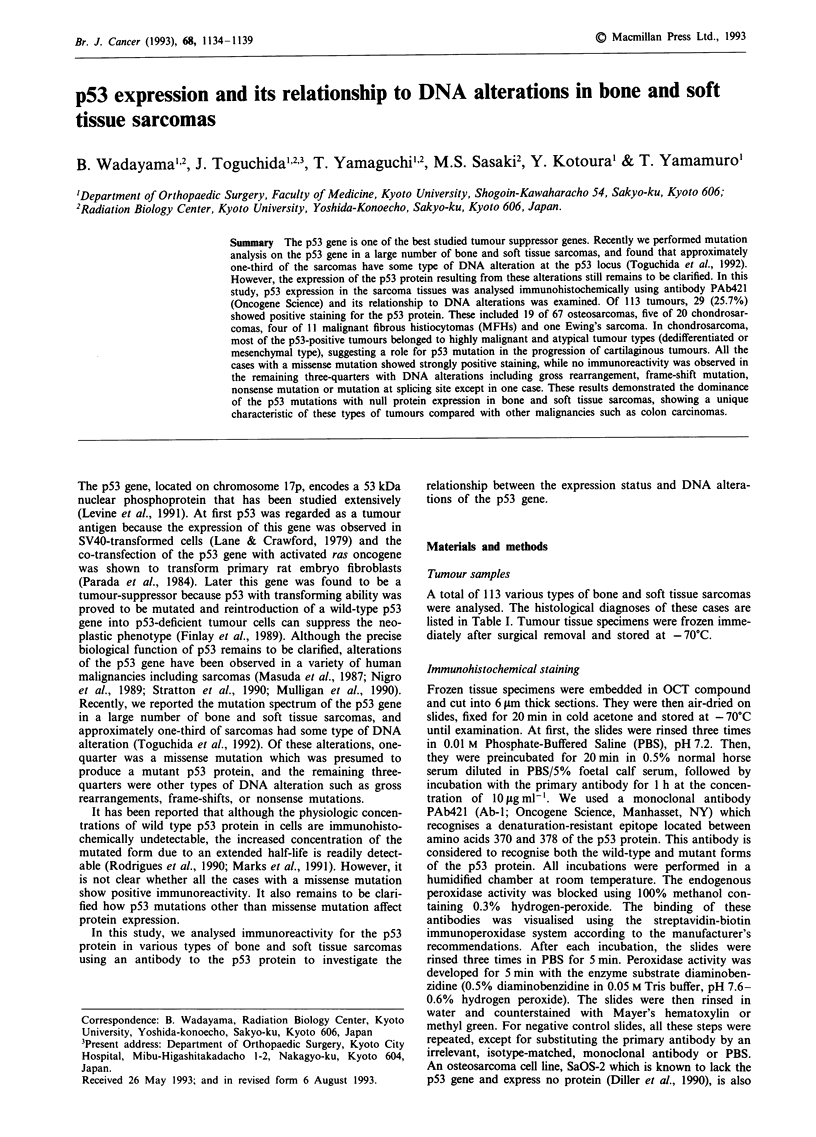
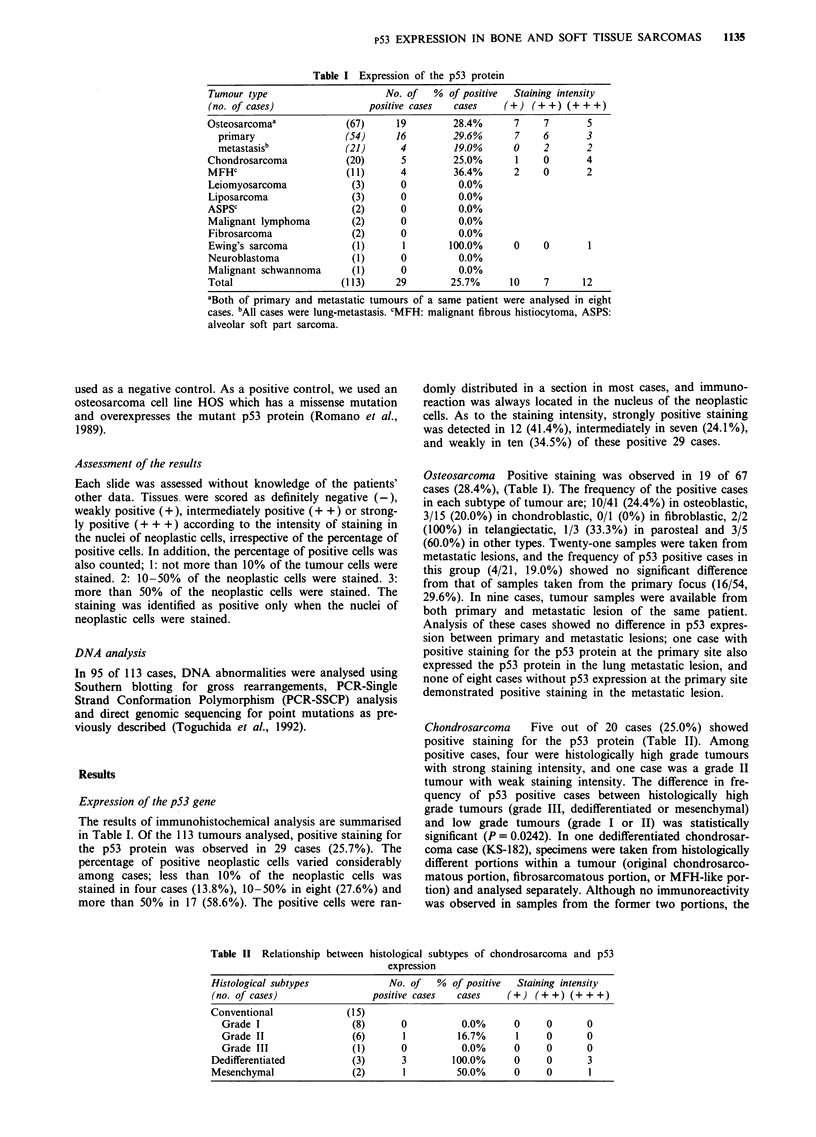
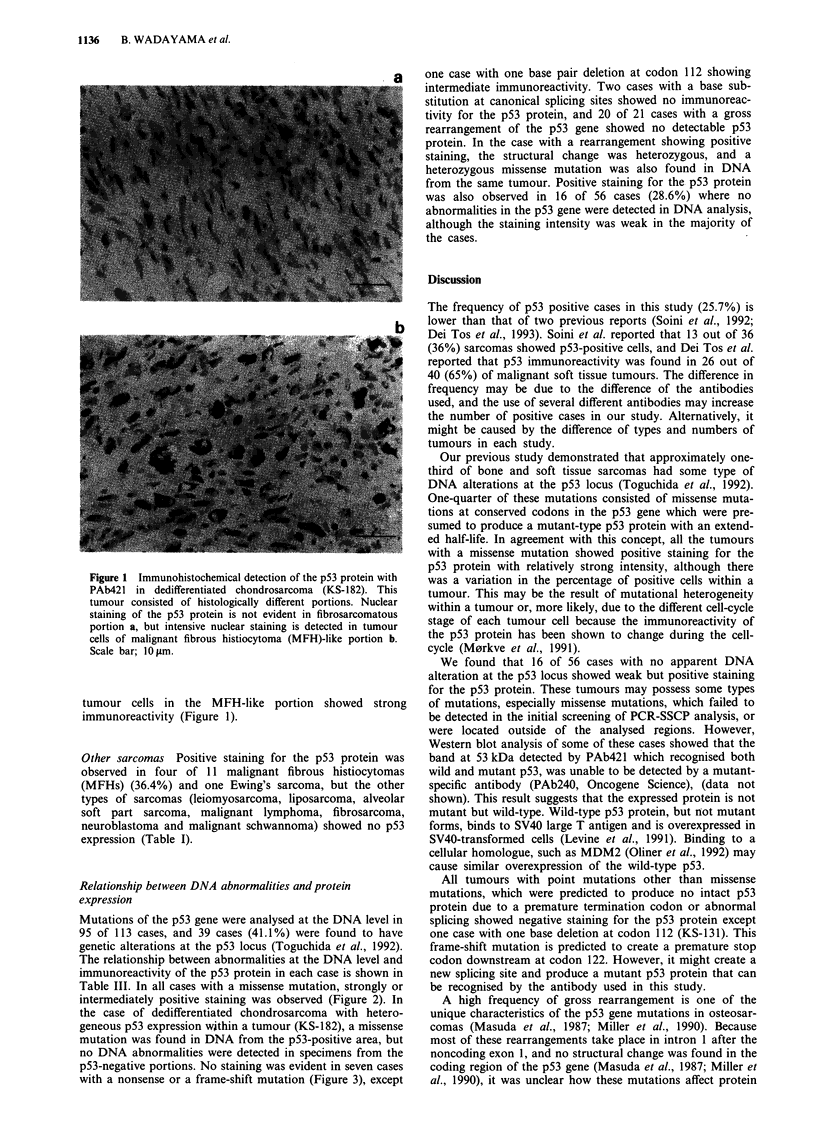
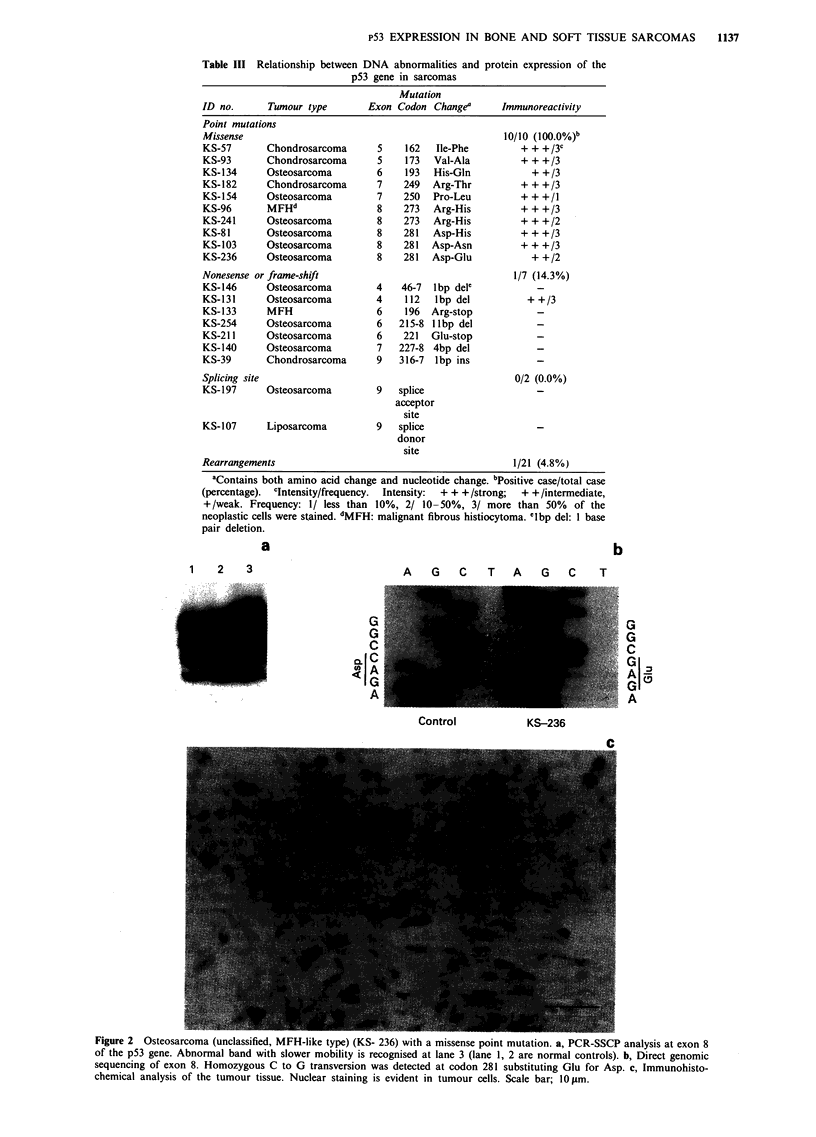
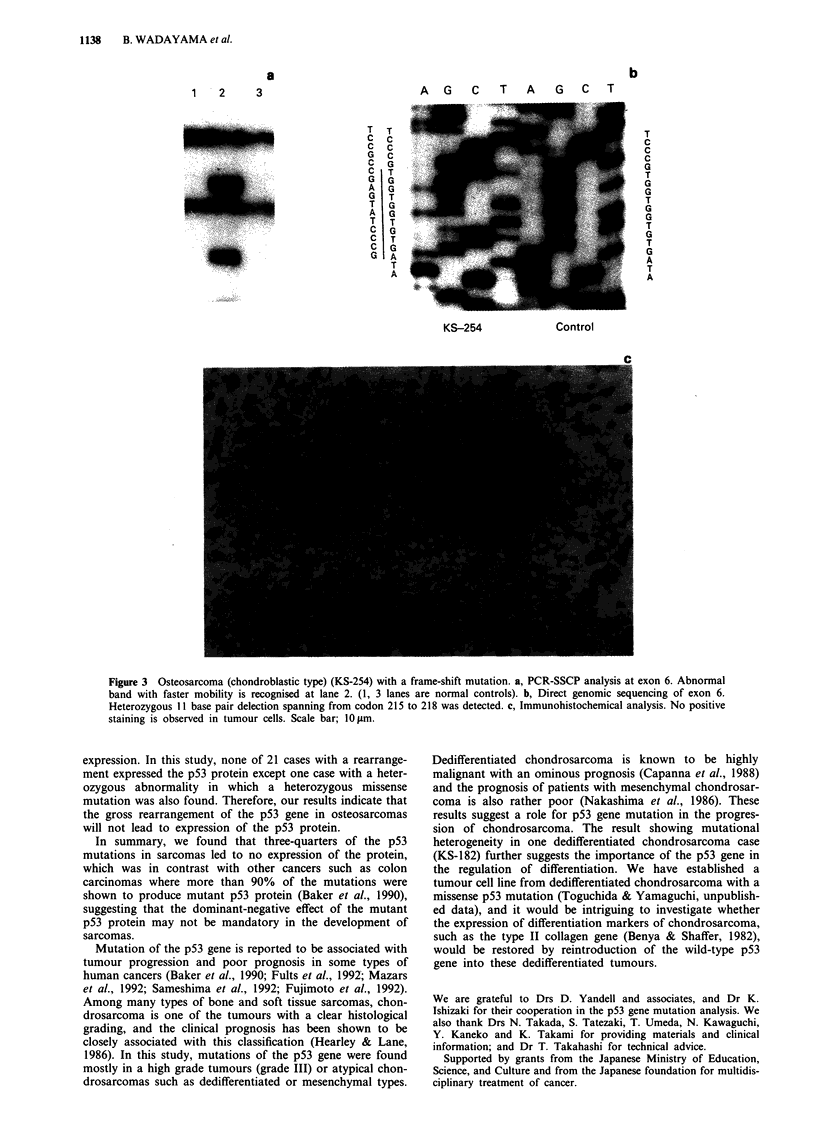
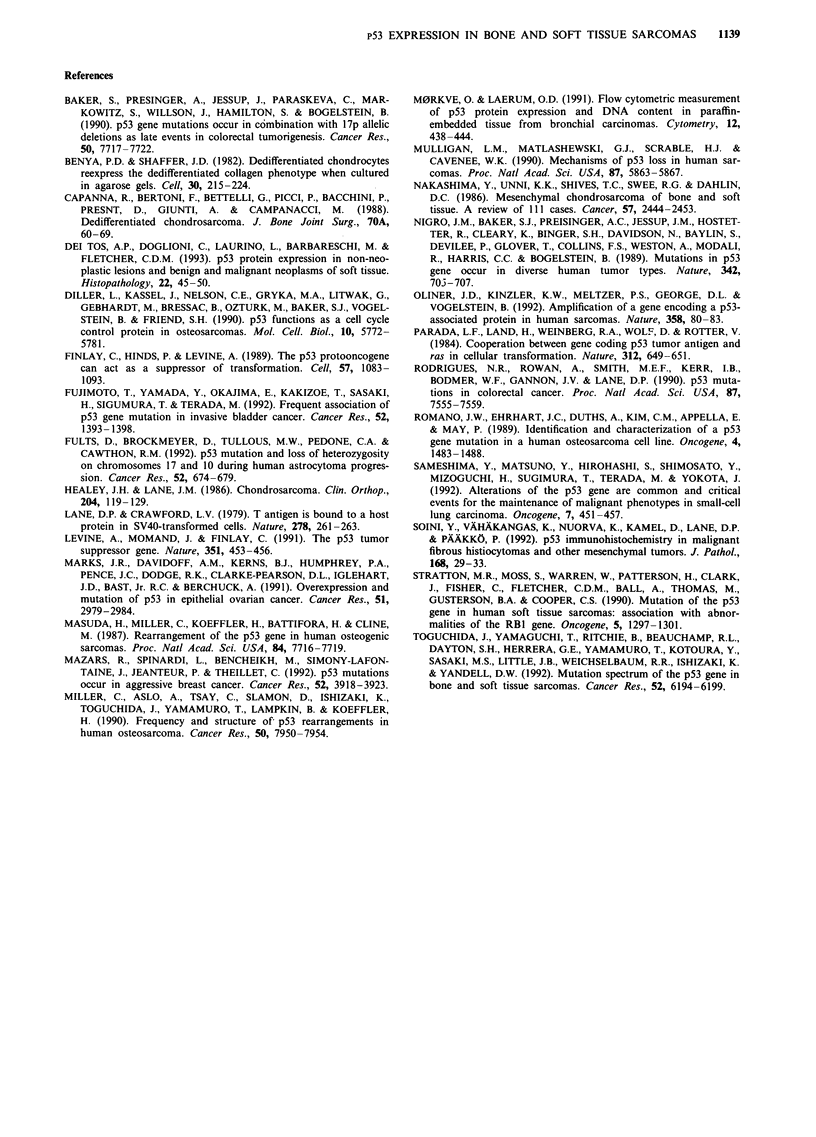
Images in this article
Selected References
These references are in PubMed. This may not be the complete list of references from this article.
- Baker S. J., Preisinger A. C., Jessup J. M., Paraskeva C., Markowitz S., Willson J. K., Hamilton S., Vogelstein B. p53 gene mutations occur in combination with 17p allelic deletions as late events in colorectal tumorigenesis. Cancer Res. 1990 Dec 1;50(23):7717–7722. [PubMed] [Google Scholar]
- Benya P. D., Shaffer J. D. Dedifferentiated chondrocytes reexpress the differentiated collagen phenotype when cultured in agarose gels. Cell. 1982 Aug;30(1):215–224. doi: 10.1016/0092-8674(82)90027-7. [DOI] [PubMed] [Google Scholar]
- Capanna R., Bertoni F., Bettelli G., Picci P., Bacchini P., Present D., Giunti A., Campanacci M. Dedifferentiated chondrosarcoma. J Bone Joint Surg Am. 1988 Jan;70(1):60–69. [PubMed] [Google Scholar]
- Dei Tos A. P., Doglioni C., Laurino L., Barbareschi M., Fletcher C. D. p53 protein expression in non-neoplastic lesions and benign and malignant neoplasms of soft tissue. Histopathology. 1993 Jan;22(1):45–50. doi: 10.1111/j.1365-2559.1993.tb00068.x. [DOI] [PubMed] [Google Scholar]
- Diller L., Kassel J., Nelson C. E., Gryka M. A., Litwak G., Gebhardt M., Bressac B., Ozturk M., Baker S. J., Vogelstein B. p53 functions as a cell cycle control protein in osteosarcomas. Mol Cell Biol. 1990 Nov;10(11):5772–5781. doi: 10.1128/mcb.10.11.5772. [DOI] [PMC free article] [PubMed] [Google Scholar]
- Finlay C. A., Hinds P. W., Levine A. J. The p53 proto-oncogene can act as a suppressor of transformation. Cell. 1989 Jun 30;57(7):1083–1093. doi: 10.1016/0092-8674(89)90045-7. [DOI] [PubMed] [Google Scholar]
- Fujimoto K., Yamada Y., Okajima E., Kakizoe T., Sasaki H., Sugimura T., Terada M. Frequent association of p53 gene mutation in invasive bladder cancer. Cancer Res. 1992 Mar 15;52(6):1393–1398. [PubMed] [Google Scholar]
- Fults D., Brockmeyer D., Tullous M. W., Pedone C. A., Cawthon R. M. p53 mutation and loss of heterozygosity on chromosomes 17 and 10 during human astrocytoma progression. Cancer Res. 1992 Feb 1;52(3):674–679. [PubMed] [Google Scholar]
- Healey J. H., Lane J. M. Chondrosarcoma. Clin Orthop Relat Res. 1986 Mar;(204):119–129. [PubMed] [Google Scholar]
- Lane D. P., Crawford L. V. T antigen is bound to a host protein in SV40-transformed cells. Nature. 1979 Mar 15;278(5701):261–263. doi: 10.1038/278261a0. [DOI] [PubMed] [Google Scholar]
- Levine A. J., Momand J., Finlay C. A. The p53 tumour suppressor gene. Nature. 1991 Jun 6;351(6326):453–456. doi: 10.1038/351453a0. [DOI] [PubMed] [Google Scholar]
- Marks J. R., Davidoff A. M., Kerns B. J., Humphrey P. A., Pence J. C., Dodge R. K., Clarke-Pearson D. L., Iglehart J. D., Bast R. C., Jr, Berchuck A. Overexpression and mutation of p53 in epithelial ovarian cancer. Cancer Res. 1991 Jun 1;51(11):2979–2984. [PubMed] [Google Scholar]
- Masuda H., Miller C., Koeffler H. P., Battifora H., Cline M. J. Rearrangement of the p53 gene in human osteogenic sarcomas. Proc Natl Acad Sci U S A. 1987 Nov;84(21):7716–7719. doi: 10.1073/pnas.84.21.7716. [DOI] [PMC free article] [PubMed] [Google Scholar]
- Mazars R., Spinardi L., BenCheikh M., Simony-Lafontaine J., Jeanteur P., Theillet C. p53 mutations occur in aggressive breast cancer. Cancer Res. 1992 Jul 15;52(14):3918–3923. [PubMed] [Google Scholar]
- Miller C. W., Aslo A., Tsay C., Slamon D., Ishizaki K., Toguchida J., Yamamuro T., Lampkin B., Koeffler H. P. Frequency and structure of p53 rearrangements in human osteosarcoma. Cancer Res. 1990 Dec 15;50(24):7950–7954. [PubMed] [Google Scholar]
- Mulligan L. M., Matlashewski G. J., Scrable H. J., Cavenee W. K. Mechanisms of p53 loss in human sarcomas. Proc Natl Acad Sci U S A. 1990 Aug;87(15):5863–5867. doi: 10.1073/pnas.87.15.5863. [DOI] [PMC free article] [PubMed] [Google Scholar]
- Mørkve O., Laerum O. D. Flow cytometric measurement of p53 protein expression and DNA content in paraffin-embedded tissue from bronchial carcinomas. Cytometry. 1991;12(5):438–444. doi: 10.1002/cyto.990120509. [DOI] [PubMed] [Google Scholar]
- Nakashima Y., Unni K. K., Shives T. C., Swee R. G., Dahlin D. C. Mesenchymal chondrosarcoma of bone and soft tissue. A review of 111 cases. Cancer. 1986 Jun 15;57(12):2444–2453. doi: 10.1002/1097-0142(19860615)57:12<2444::aid-cncr2820571233>3.0.co;2-k. [DOI] [PubMed] [Google Scholar]
- Oliner J. D., Kinzler K. W., Meltzer P. S., George D. L., Vogelstein B. Amplification of a gene encoding a p53-associated protein in human sarcomas. Nature. 1992 Jul 2;358(6381):80–83. doi: 10.1038/358080a0. [DOI] [PubMed] [Google Scholar]
- Parada L. F., Land H., Weinberg R. A., Wolf D., Rotter V. Cooperation between gene encoding p53 tumour antigen and ras in cellular transformation. Nature. 1984 Dec 13;312(5995):649–651. doi: 10.1038/312649a0. [DOI] [PubMed] [Google Scholar]
- Rodrigues N. R., Rowan A., Smith M. E., Kerr I. B., Bodmer W. F., Gannon J. V., Lane D. P. p53 mutations in colorectal cancer. Proc Natl Acad Sci U S A. 1990 Oct;87(19):7555–7559. doi: 10.1073/pnas.87.19.7555. [DOI] [PMC free article] [PubMed] [Google Scholar]
- Romano J. W., Ehrhart J. C., Duthu A., Kim C. M., Appella E., May P. Identification and characterization of a p53 gene mutation in a human osteosarcoma cell line. Oncogene. 1989 Dec;4(12):1483–1488. [PubMed] [Google Scholar]
- Sameshima Y., Matsuno Y., Hirohashi S., Shimosato Y., Mizoguchi H., Sugimura T., Terada M., Yokota J. Alterations of the p53 gene are common and critical events for the maintenance of malignant phenotypes in small-cell lung carcinoma. Oncogene. 1992 Mar;7(3):451–457. [PubMed] [Google Scholar]
- Soini Y., Vähäkangas K., Nuorva K., Kamel D., Lane D. P., Päkkö P. p53 immunohistochemistry in malignant fibrous histiocytomas and other mesenchymal tumours. J Pathol. 1992 Sep;168(1):29–33. doi: 10.1002/path.1711680106. [DOI] [PubMed] [Google Scholar]
- Stratton M. R., Moss S., Warren W., Patterson H., Clark J., Fisher C., Fletcher C. D., Ball A., Thomas M., Gusterson B. A. Mutation of the p53 gene in human soft tissue sarcomas: association with abnormalities of the RB1 gene. Oncogene. 1990 Sep;5(9):1297–1301. [PubMed] [Google Scholar]
- Toguchida J., Yamaguchi T., Ritchie B., Beauchamp R. L., Dayton S. H., Herrera G. E., Yamamuro T., Kotoura Y., Sasaki M. S., Little J. B. Mutation spectrum of the p53 gene in bone and soft tissue sarcomas. Cancer Res. 1992 Nov 15;52(22):6194–6199. [PubMed] [Google Scholar]




